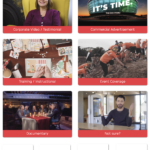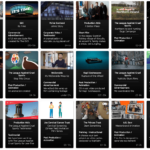Are you planning on using some interview footage in your next video? Don’t forget to plan ahead with these pointers.
And you may be surprised to know that the trick is actually not to plan too much.
Think about setting
If you’re interviewing a customer or an employee, the chances are they’ve never been in front of a camera before.
Bear this in mind when you start, and make them as comfortable as possible.
This may mean minimising the amount of people on set, making sure no passers-by can peek in and distract them, or conducting the interview in a familiar setting like their own home or office.
Another tip is to start talking informally to get them warmed up, starting with the easiest topics and leading into more complex issues.
Don’t write out questions
Planning out the exact wording of all the questions you want to ask can leave your interview feeling staged and scripted. Yuck!
It also doesn’t leave you any wiggle room to read the situation, and delve deeper into topics as they naturally occur in conversation.
Working from a script is likely to leave you too concerned about getting back to the schedule instead of letting the story unfold naturally.
Decide on topics
Instead of planning specific questions, map out the general subjects you want to cover as a prompt to keep the conversation moving.
For example, say you are interviewing an employee about what tasks are involved in their job.
Instead of asking them to simply list the tasks, you might ask “Take me through a typical day for you”
FREE GUIDE: 5 Types of Video to Improve Your Business
This leaves it open to interpretation, and may even encourage a few personal touches like where they like to get their morning coffee.
This will in turn add personality to the interview which will keep your viewers tuned in for longer.
Work out timings
Once you know how long you want the clip to be you can assume that the person you’re interviewing will talk for around a minute on each topic.
So for a five minute clip, write out a list of five areas you would like to cover.
Of course, the more footage the better so let them talk for longer if you feel like you’re getting some great material.
Don’t let them see the questions
It might sound harsh but the less your subject knows the better!
Allowing them to see the list of talking points or even worse, having a rehearsal, will only result in an unnatural performance.
Keep the situation comfortable and conversational at all times.
Maintain good eye contact and listen well to their response, and allow your natural curiosity to guide your questions even if it leads you to something you weren’t planning on asking. It’s all part of the process!
Need help with the edit? Check out our services here.












